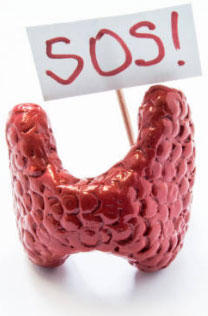Home > > What is iodine deficiency
Solving the problem of iodine deficiency
Solving the problem of iodine deficiency


partners
cart
What is iodine deficiency
The problem of iodine deficiency was acute in all ages and for all generations. The first scientific descriptions of goiter and diseases associated with iodine deficiency are found in Denis Diderot Encyclopedia (1754). It is believed that the Neanderthals who inhabited the European continent 30,000 years ago suddenly died out due to eating disorders (iodine deficiency). The employee of the National Laboratory of Texas D. Dobson was prompted to this idea by the results of a survey of the bones of 300 skeletons of Neanderthals kept in museums, 17 of which had signs of cretinism…

The UN puts the problem of iodine deficiency at one level with the problem of AIDS. Only for 10 years (1993-2003), the number of cancer patients increased by 25.7%. The world community considers this problem as global. Iodine deficiency is addressed by the International Council on Iodine Deficiency Diseases, the United Nations Children's Fund (UNICEF), the World Health Organization (WHO), the International Organization for the Survival and Protection of Child Development, hundreds of regional and national committees, and specialized institutions.
Today iodine deficiency has been officially recognized in more than 153 countries around the world. Unfortunately, Ukraine, Russia and other European countries are no exception. Uncompensated natural iodine deficiency across the country forms a backward society and significantly reduces the level and quality of human life.
As you know, our body consists almost of a complete and balanced set of the table by D.I. Mendeleyev. Moreover, each of these elements, entering the human body and becoming a nutrient, is important in its own way for the normal functioning of both individual organs and the whole organism. Catalytic substances have an emphasis on the human body. This group includes vitamins and microelements. As a rule, all these substances in our body come from food, water we drink and the air we breathe.
Let's look at the ecology today: constant emissions of radioactive substances into the atmosphere, introduction of mineral fertilizers and chemical plant protection products from pests into the atmosphere, environmentally hazardous production and a rapid increase in the number of automobiles. Due to these and several other reasons, human health is at risk. We live in conditions of constant irradiation with small doses, in the conditions of air and water pollution, the norms of which are tens of times higher than the maximum permissible, as well as in unsanitary and virus epidemics conditions.
Therefore, there is no longer any need to talk about the ingestion of enough nutrients into the human body. We receive little, or do not receive at all. And it is the deficiency of iodine (the human body does not produce iodine on its own, it comes only from the outside) is the main cause of various diseases and leads to very disastrous consequences for all mankind…
Insufficient intake of iodine in the human body is called iodine deficiency.
Чем опасен йододефицит?
Iodine belongs to the group of essential (vital) microelements and plays a huge role in the development and normal functioning of the human body. Iodine is recognized as an element of INTELLECT and is one of the most important, affecting the work of almost all internal organs and systems.
Deficiency of iodine does not sometimes have very pronounced external manifestations, therefore it was called "hidden hunger". It can be manifested by lethargy, drowsiness, fast fatigue, forgetfulness, inability to concentrate, bad mood, low hemoglobin level, frequent catarrhal diseases, the appearance of edema. This kind of hormone disorders caused by iodine deficiency, initially proceed unnoticed and do not disturb the person in any way. But over the years they take the form of pronounced, sometimes severe illnesses and become life-threatening…
Therefore, such leading organizations as UNICEF, WHO, MOH strongly recommend not to ignore this problem, and for prevention purposes, to prevent the development of iodine deficiency diseases, to introduce daily consumption of microelement iodine into your diet, in accordance with the recommended daily norms.What is the role of iodine for human?
- The main role of iodine in the body is to ensure the functioning of the thyroid gland. Iodine is an irreplaceable and unique participant in the synthesis of thyroid hormones and is an integral part of them. Iodine-containing thyroid hormones regulate many processes in the human body, including growth and development, as well as the intensity of basal metabolism, affect the water-salt, fat and carbohydrate metabolism.
- The normal work of the brain, the central nervous system and the mental condition depend on the iodine content in the body: the cells grow and develop, the emotional background is formed, irritability is removed. Iodine is a pledge of high mental activity.
- Iodine protects against diseases of the cardiovascular system, prevents the formation of blood clots, lowers cholesterol level. It is also necessary for the regulation of the musculoskeletal system.
- Without iodine, the normal operation of the pancreas, the most important organ responsible for digestion and regulation of blood sugar levels, is impossible. Iodine is important for liver function.
- Iodine also contributes to the formation of cells necessary for our body – phagocytes, kind of nurses, capturing and destroying foreign microorganisms and damaged cells.
- Iodine is needed for the normal functioning of the reproductive system, both in women and men.
- Enough iodine in the body of a pregnant woman helps to ensure the correct intrauterine development of the child.
- Iodine is very necessary for the growth and harmonious mental and physical development of children and adolescents, it is involved in the formation of bone-cartilaginous tissue, the synthesis of protein, stimulates mental abilities, improves performance and reduces fatigue.
- Iodine increases the body's oxygen consumption and gives energy.
- Iodine helps to cope with excess weight. The rate of fat burning depends on the amount of iodine in the body. With the abundance of iodine, dieting for weight loss gives a much greater effect.
- Iodine has a beneficial effect on the condition of the skin, teeth, hair and nails.
Thus, the lack of iodine in the body causes:
 In women of childbearing age:
In women of childbearing age:infertility or non-pregnancy, congenital anomalies of the fetus, death of the fetus.
 Children and adolescents:
Children and adolescents:delay in development, decrease of intellectual abilities, weak immunity, interruption of puberty.
 In newborns:
In newborns: congenital hypothyroidism, cretinism, deafness, strabismus and other multiple developmental anomalies.
 At all ages:
At all ages:disfunction of the thyroid gland, the development of various kinds of diseases: endocrine, immunodeficient, oncological, cardiovascular, bronchopulmonary, osteochondrosis, dermatological, gynecological, somatic, mental.
Adequate intake of iodine is a prerequisite for health!


